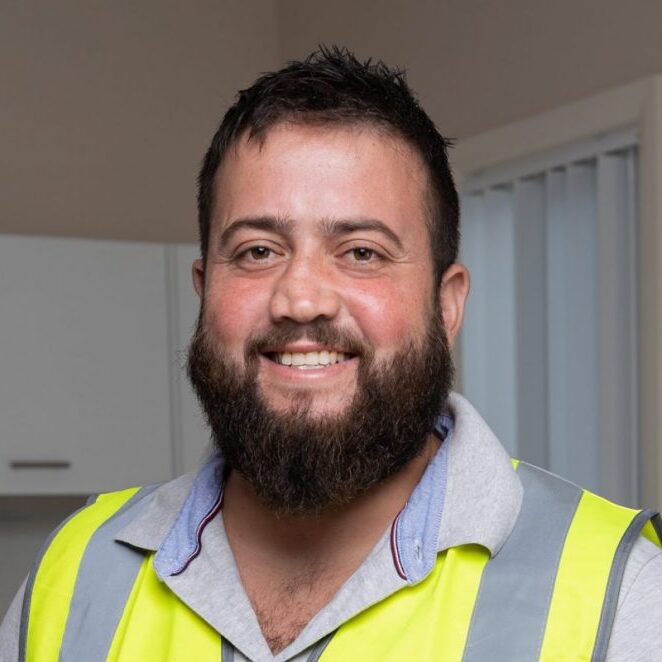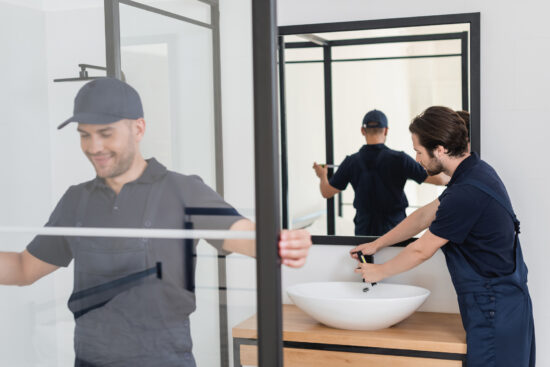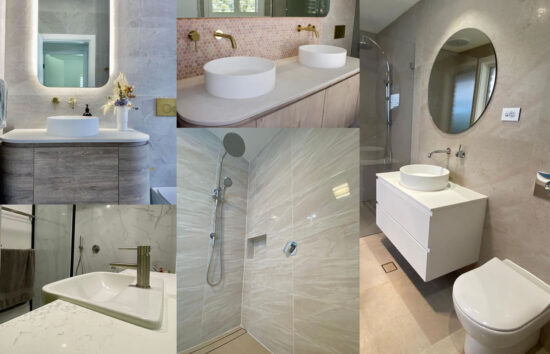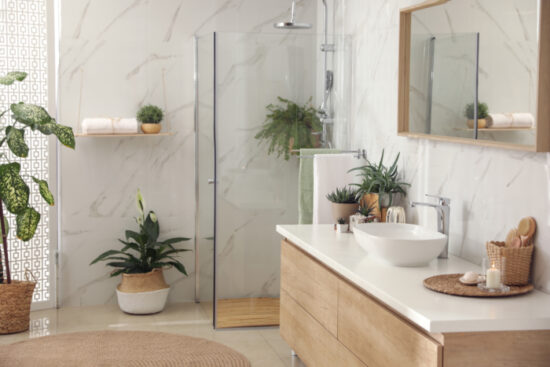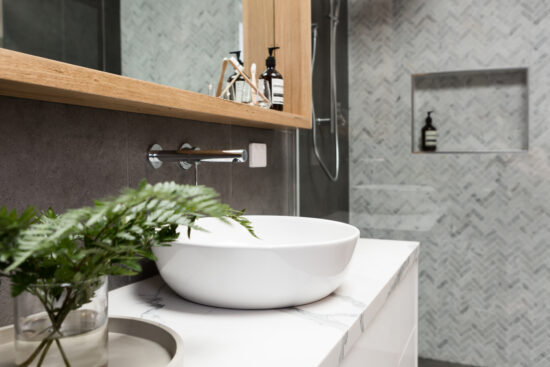Waterproofing is barely a consideration for some homeowners until their home gets a good drenching – and it’s not from the incessant rain. Unfortunately, bathroom waterproofing defects have become all too common these days. A recent Griffith-Deakin study revealed that 97 per cent of buildings built in 2003 and 2018 in NSW had at least one defect, and waterproofing was the most common.
So, if you’re planning a bathroom renovation, getting some repairs done or building a new bathroom, you’re probably wondering whether you need to waterproof your entire bathroom or just the shower recess.
Waterproofing the shower recess is the minimum requirement to meet Australian Standards. But waterproofing the entire bathroom floor minimises the risk of leaks and structural damage, giving homeowners greater peace of mind.
The extent of the waterproofing job may depend on your bathroom type, materials used in construction and even location. Let’s break it down further.
What is Bathroom Waterproofing?
Bathroom waterproofing is the application of a liquid membrane to your bathroom walls and floors to prevent moisture from penetrating into your home.
Waterproofing is important in any room where water is used, but it’s especially critical in the bathroom. That’s because bathrooms are wet areas, which means they’re more prone to water damage than any other room. The National Construction Code (NCC) requires all wet areas in a home, including bathrooms and laundries, to be waterproofed. The minimum requirement is for shower bases, baths, toilets and vanities to have waterproofing.
Typical waterproofing materials include a waterproofing membrane, waterproofing agent, sealing silicone and primer. A waterproof membrane is applied to a wet surface and left to dry. Waterproofing is usually done before adding tiles to a new bathroom or during a bathroom renovation. It can also be a preventative measure to waterproof an existing bathroom showing signs of water damage, such as cracked tiles or grout, peeling paint or damp walls.
Thorough waterproofing ensures water doesn’t cause major structural damage, which is why it should ideally be done by waterproofing specialists who are up to speed with Australian Standards.
What are the Australian Standards for Waterproofing?

The Building Code of Australia and the Australian Standard (AS 3740-2010) have set out regulations for waterproofing shower floors and walls. The minimum requirements are:
- The entire floor should be waterproofed for the shower area, and the shower walls need waterproofing up to 1800mm.
- Bathroom walls need waterproofing up to 150mm.
- For wooden bathroom floors or bathrooms on higher levels, the entire bathroom floor needs waterproofing.
- Any step-downs to floors must be waterproofed to 100mm.
Waterproofing should be carried out by a licensed professional who is experienced in applying waterproof membranes.
Do I Waterproof the Shower or Entire Bathroom?
Waterproofing the shower recess floor is the minimum requirement according to Australian Standard 3740-2010. It is the most important area to waterproof as it is constantly exposed to water. Without waterproofing, water will eventually seep through grout lines and cracks in tiles, which can lead to serious structural issues.
While you may not have to waterproof your whole bathroom floor, it is always ideal for the additional layer of protection and to ensure no damage to your property. Waterproofing the entire bathroom is always the safest and most effective approach to protect your home from water damage – especially if you have a wet room bathroom design, a common feature of many modern homes today.
A wet bathroom does not have a separate shower enclosure with a shower screen. They are popular because they do away with the need for a shower screen, which makes it easier to maintain. Not only does a wet bathroom open up the space and make it bigger, but it is also easier for people with mobility issues to use.
But because the entire bathroom floor will be wet rather than just the shower floor and wall, you’ll have to consider more extensive waterproofing.

How Much Does it Cost to Waterproof a Bathroom?
The actual cost to waterproof a bathroom will depend on a number of factors, including the size of your bathroom, the type of materials used and the project’s complexity.
On average, you can expect to pay between $50 and $100 per square metre for a professional to waterproof a bathroom. For an average-sized bathroom, this could mean between $800 to $2,000, including materials, labour and a waterproofing agent. If you have a more complex setup, then the job can go up to $4,000. Bathroom waterproofing costs for just the shower area may be between $200 to $1,000 based on size.
The best way to get a more accurate bathroom waterproofing cost is to ask a bathroom renovation or waterproofing professional for a quote.
Who Should Do Waterproofing?
Many homeowners may consider a DIY job, but faulty waterproofing will lead to mould issues, cracking and swelling tiles, which will be costly in the long run. It is always best to hire a professional who is experienced and licensed in waterproofing to carry out the work. A qualified professional will know exactly what needs to be done to ensure your bathroom is properly waterproofed and AS-compliant.
Also, keep in mind that some states like New South Wales and Queensland require a licensed professional to do the waterproofing job for safety and compliance. Ideally, they will provide you with a statement of compliance after the work is done. In other states, any job must meet Australian Standards, so DIY work is generally not advisable for anyone except skilled tradespeople.
How Long Does Waterproofing Last?
A basic waterproof membrane should last at least ten years. But under the right circumstances, they can easily last longer. Poor waterproofing, on the other hand, may not go the distance.
Factors like workmanship, membrane quality and preventative maintenance can influence the longevity of a waterproofing job. Membranes should also be strong enough to withstand any structural movements or chemicals. The weak points of any waterproofing system are where the vertical and horizontal surfaces join, which is why these areas should be given extra attention.
Regular maintenance is essential to prolong the life of any waterproofing job. This includes checking for leaks, cracks or any other damage. It is also important to ensure proper drainage around the area.
What are the Signs of Poor Bathroom Waterproofing?

Several signs indicate your bathroom is not properly waterproofed. Although they may seem small initially, quick action is necessary to prevent major structural and mould issues in the long run. Some warning signs to look for include:
- Cracking, blistering or peeling paint
- Damp patches on the ceiling and walls
- Mould and mildew on floors, walls and ceilings
- Peeling and cracking wallpaper
- Rust or stains on walls
- Wall cracks in bathrooms
- Tile and grout damage
- Water seeping from under doors
- Bubbling or lifting floor coverings
If you notice any of these signs, it is important to get professional help as soon as possible.
How to Waterproof a Bathroom?
Waterproofing involves applying a liquid membrane onto wet areas to create a special seal that prevents water from seeping through. It is a multi-step process that requires the application of different products, including a primer, first coat and second coat.
The first step is ensuring the area is clean, dry and free from any soap residue, oils or grease. Once that’s done, a primer coat is applied before the first coat. The first coat is left to cure for at least 24 hours before the second coat is applied. Typically, two coats of the membrane are applied across the shower enclosure floors and walls or the entire bathroom floor to ensure a thorough job.
Once the waterproofing membrane has been applied, a layer of protective material is placed over it. This could be either tiles or another type of cladding. The ultimate purpose is to prevent leakages through grouting or joins. Waterproofing products should be given at least 24 hours to dry for a proper seal.
How Do I Prevent Waterproofing Issues?
The best way to avoid waterproofing issues is to get the job done right in the first place. This means using a qualified and trusted professional to do the waterproofing.
It’s also ideal to regularly inspect the bathroom and look out for signs of leaks. This doesn’t require any special effort – just a keen eye. Getting them fixed as soon as possible is important to avoid further damage if you spot any leaks.
The Bottom Line
Waterproofing is a process that helps to prevent water damage in your home by creating a barrier between the water and the surface you wish to protect. We know there isn’t a legal requirement, but we believe it’s always better to err on the side of caution. We generally advise our clients to waterproof all domestic wet areas, including entire bathrooms. Waterproofing your entire bathroom is the safest way to avoid any expensive structural property damage. It may seem like a big and daunting task, but hiring a professional will give you peace of mind and ensure that the job is done properly.
Bathroom renovation experts like DCON Group are licensed and experienced in bathroom waterproofing. We take it seriously because we know how easily a poor job can damage your home. We can waterproof your bathroom as a standalone project or as part of a complete renovation.
If you’re unsure whether your bathroom needs waterproofing, give us a call for a quick chat. We are happy to assess the space and advise you on the best course of action.


